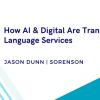We have entered an age in which technology is leveraged to achieve almost anything. What was once fanciful is now being implemented and disrupting how we pay for products, heat our homes and shop for groceries.
With automation and technological advancement as the cornerstone in many sourcing solutions, what space is there for enterprise-wide relationships, human involvement and skill development? Do customers care about their relationships with their service providers anymore, or is technology now so advanced that it has eroded the value in finding the right cultural fit?
A customer/service provider relationship will often be determined by what the customer wants from its service provider, and what service it needs. In recent years, customers have moved away from the traditional sole-source environment where global providers have a function-wide scope. Instead, customers – certainly in the IT/digital space – are choosing providers by specialism or specific solution, often from a “one-to-many” platform. With a lower associated financial value, it may be perceived that there is less of a requirement to forge strong and lasting relationships. This trend might also suggest that providers are less inclined to offer bespoke interaction to customers because of the cost and time associated with relationship development. This may suit the customer, if that is what it wants from its service provider.
Artificial Intelligence (AI) and data analytics-driven solutions play a role in reducing the amount of traditional human interaction between the customer and service provider. If data can be manipulated by the customer to suit day-to-day business requirements and, for example, be used to create customised reports on an adhoc basis from a management tool, then customers can be more self-sufficient, leading to less interaction with a service provider at a rudimentary level.
So, what digital solutions are really doing is changing the way we interact with each other – it may be on fewer occasions, but communication is likely to be more meaningful and important when it is required. This means that having quality communication is fundamental. The importance of customer experience has not diminished, and even though day-to-day communications may be less frequent, trust, respect and innovation are still important if the relationship is to remain current, transformative and mutually beneficial. Competition across the industry is as fierce as ever and now the interaction between the customer and service provider is even more important because it requires senior team members to get strategically involved. Successful relationships are characterized by blending human interaction and technology to quickly identify and solve problems, increase value and drive progress.
These more sophisticated relationships, without the traditional touchpoints, require a greater degree of strategic governance, communication and collaboration between customer and provider (and between multiple providers) as services interface and integrate across potentially complex environments. Customers want efficiency and the digital solutions offered by the service provider are an important part of driving that efficiency throughout their business functions and processes. A high level of collaboration between the service provider and customer is required to understand the efficiency needs and to work together to design and develop improvements. Ultimately, if both parties understand the customer’s requirements and are clear on how business objectives can be satisfied, then there will be alignment between their interests and goals leading to a relationship beneficial to them both.
This alignment comes from having an engaged, inquisitive workforce who know what questions to ask of their outsourcing partner, and should not be based on a small number of individuals from a project or sales team. Training teams to respect their workplace and their brand, while simultaneously “living and breathing” a culture is a challenge when some staff consider their careers under threat from technological advances. Successful organizations are built on recognizing the importance of talent management and incentivizing staff to operate consistently across the enterprise. If morale is low or the workforce feels undervalued, the organization – and its relationships – are likely to suffer.
When it comes to documenting a long-term relationship, it’s impossible to legislate for every eventuality, change and technological development, especially when you’re operating across multiple jurisdictions. However, there are a variety of contractual mechanisms that can be used to encourage good behavior from both sides of the relationship. Contracts can be drafted to address changes in technology, encourage innovation and look at how these changes can be priced. If digital transformation is important to your business but you’re not at the stage to fully commit, flexibility will be key going forward. This can only work when change and innovation are expected and accepted by both sides. All contractual mechanisms require—at the very least—a rudimentary understanding of the potential outcomes (should certain events occur) and the consequential effects to the customer, the service provider and the solution. If the parties understand the customer’s strategy, and digital innovation and talent management are integral to that, then documenting specific objectives and innovation should not be challenged and collaboration between the parties will not only be expected but actively encouraged.
Strong, successful relationships often involve greater collaboration and communication, and using technology does not undermine those relationships, nor does it destroy the need for talent management and human interaction. If teams understand the value in digital solutions and data analytics and know when to implement them, then technology will facilitate trust and human innovation.
Region:






